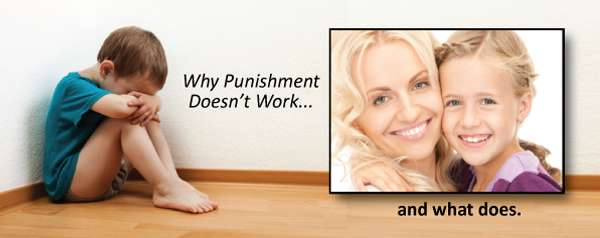 |
You are driving on the highway. You are going a bit over the speed limit. (Okay, maybe more than just a bit…). In front of you, you see a police cruiser on the side of the road. Your heart jumps a bit. Your foot touches the breaks and you slow down. You pass the police officer unscathed. Whew! You feel grateful, and just a little bit afraid of what could have been. So you start driving more slowly.
For about a minute and a half that is.
Okay, let’s change the scenario. Same situation – except, as you pass the police officer, you see the lights start flashing. The police officer starts his vehicle and pulls you over. You get a ticket. You thank the officer as he gives it to you, feeling a bit odd about thanking him for a ticket. You put the ticket in the glove compartment. And this time you really do slow down.
For about seven minutes.
Okay, let’s change the scenario one more time. Same situation. You get pulled over. You get a ticket. But it’s a ticket for $50,000.00. And they take away your license for a full year. You pay the $50,000.00. At great inconvenience, you take the subway to work for the next year. And now, it’s a year later. Hurray! You get your license back!
And you never speed again.
Now, you know this is true. So, what does it tell us about punishment? Well, it suggests exactly what decades of research tell us about punishment.
Does punishment “work”? Well, it depends on what you mean by “work”. If by “work” you mean, “Does punishment stop unwanted behavior”, well the answer is “yes” – but only in two types of circumstances.
The first set of circumstances occurs when the punishing agent is present. So, you are driving and you see the police officer. You slow down! The threat of punishment here caused you to slow down and drive within the speed limit. But what happened once the police officer was no longer in sight? You guessed it. You’re back up to speed.
The second set of circumstances occurs when the punishment is so severe, so intense, that it is seriously debilitating in some way. So, after your $50,000.00 ticket and a year’s hiatus from driving, you have been so severely pained that you will never speed again.
So, again, punishment stops unwanted behavior, but only for the short term when the punisher is present, or if the punishment is so severe as to be debilitating.
And few of us will find either one of these circumstances to be acceptable for our children. In so far as debilitating punishment is concerned, we certainly do not want to bring harm to our children. Compliance to rules at the cost of serious pain is simply unacceptable to us.
But even short term compliance in the present of the punisher is not acceptable. We want our children to act responsibly not only during the short term when we are physically near them, but also in the long term when we are not present!
Punishment simply doesn’t work as a primary disciplinary strategy.
So, What Does Work?
Now, this raises the obvious question: What does work? Again, what do we mean by “work”? By “work”, I mean the goal of promoting responsible behavior in the long run. Most parents would like their children to be able to be control their own behavior, and bring it in line with various social and moral standards that we hold dear. Most parents want children to be able to do this when parents or other authority figures are not around. They want their children to internalize valued rules and standards and make them their own. So with this idea in mind, what works?
To answer this question, it is important to see that there is a big difference between “punishment” and “discipline”. Simply put, punishment is the act of giving a person something that he or she doesn’t like (or taking away something the person likes) in order to eliminate unwanted behavior. Here are some common punishments: A speeding ticket; a spanking; being sent to your room; taking away a child’s train set for writing on the wall; going to be without supper; being grounded for not doing one’s chores, etc.
Discipline is simply the process of socializing children to take responsibility for their actions. A person who has discipline is able to control her behavior; she is able to act responsibly in accordance with social standards. There are many ways to foster discipline in a child. The most effective ways do not involve punishment. These strategies do not work in isolation from each other. In order to work, they must generally be used together:
Limit setting. Limit setting simply means having standards for what a child is permitted to do and what a child is not permitted to do. Effective parents have high standards for their children. Limit setting is a form of high standards. When we create rules and set limits – you have to say “please” when you ask for something; homework first; you can play only within the yard; bedtime is 9:00; be home by 10:00 – we are defining the areas for which we want our children to assume responsibility. But simply having limits is not enough – we have to enforce them in meaningful ways. How do we do this?
Explanation. No, it makes no sense to have a long negotiation with your child about the rules. You are the one setting the rules (although they can be flexible, given circumstances). However, we can explain the basis of the rules to our children. Research on the development of the internalization of rules is unequivocal. Children are more likely to internalize a rule if their parents explain the reasons for the rule to their children. Here are some examples of explanations: “Don’t hit your sister! That hurts her! How would you feel if she were to hit you?”; “We don’t write on the walls. It makes the walls messy and then you have to clean them. Instead, we write with crayon and paper”; “I want you in by 10:00 because I am worried about you driving late at night. I want you safe at home, and you need your sleep”.
Sometimes, parents are suspect of “explanation” as a discipline strategy. They may say, “I can explain a rule to my child, but that doesn’t mean she will follow it!” Yes! That is correct! Explanation simply clarifies the rule. For some children, a clear explanation is all that is needed. For most children, however, other strategies may be needed to enforce the rule.
Meaningful consequences. A meaningful consequence can sound a lot like a “punishment”. But there is a big difference. With punishment, we give a child some unpleasant experience to make a child stop behaving in some way. With meaningful consequences, a child takes responsibility for the unwanted outcomes of his own actions. A child who writes on the walls is not sent to his room; he may be directed clean the walls instead. And his crayons might be taken away unless he promises to use them only with paper. A child who refuses to eat dinner may be told that she will not get dinner later (and thus that he will have to wait until the next morning for his next meal). A child who cannot find her way home by 10:00 must demonstrate in concrete ways that she can be trusted in performing similar activities before she will be allowed to go out again. Punishments are the arbitrary pairing of pain with some unwanted behavior; meaningful consequences link a child’s behavior to the broken rule in a meaningful way.
A healthy relationship. The most important resource that you have to influence your child is your relationship with him or her. A healthy relationship is one in which a parent both enforces high expectations in the context of clear and loving communication. High expectations are needed to set a direction for the child; warmth and nurturance are needed to make the relationship work. Children who have healthy relationships with their parents come to see that their parents can be helpful – even through adolescence.
No Mamby Pamby Strategies Here
The distinction between discipline and punishment is an important one. If parents are skeptical that punishment doesn’t work, it is often because they think that without punishment, the parent has no authority. That’s simply not true. It is essential to love our children. But love alone doesn’t do the trick. Children need guidance and direction. We have to retain our authority even as we love our children. It’s not an either/or proposition — it’s both/and situation.

















